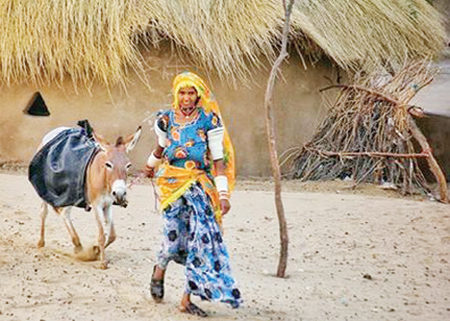ENVIRONMENT
The Thar Desert received a light shower in about 20 percent of the area, which is not sufficient for cultivation purposes, not even for growing grass.
 Despite frequent forecasts by the Meteorological Department of more rains, the weather remains uncertain, creating confusion among farmers and herders. They remain undecided about tilling their lands or waiting for more rains. Unpredictable weather patterns mean low or no cultivation for the people of Thar, who are mostly dependent on agriculture and livestock rearing for livelihood.
Despite frequent forecasts by the Meteorological Department of more rains, the weather remains uncertain, creating confusion among farmers and herders. They remain undecided about tilling their lands or waiting for more rains. Unpredictable weather patterns mean low or no cultivation for the people of Thar, who are mostly dependent on agriculture and livestock rearing for livelihood.
Some farmers started preparing lands to sow seeds just after rains. But many remained cautious recalling last year’s incidents when strong winds swept away freshly sowed seeds and tiny seedlings, leaving the farmers destitute with no money and no hope of getting a bountiful crop.
Thar witnessed scattered crops last year due to that mishap.
Dr Sono Khangharani, a renowned social development activist, keeping a close eye over the Thar situation, said the entire forecast mechanism for Thar was looking ineffective. Thar has received one low shower in 20 percent area, which is not enough for cultivation or even the possibility of growing grasses. Though the time was accurate as per the weather system, the phenomenon should have continued. The community has very little hope now.
“The community is very confused because of the unpredictable weather patterns. Their life depends on these rains. Only 50 percent livestock, which people had taken to the barrage areas, has returned to Thar, while the rest are still waiting on their traditional routes for the rains. The herders wait for rains before they head back to their homes in the desert,” Dr Khangharani said.
People cannot return until there is enough water and fodder for the animals. Hundreds of animals are yet to enter the Thar Desert due to this uncertain weather, he said. Despite the tall claims made by the government, there are no water ponds and fodder bank facilities for migratory animals, which share barrage areas and desert for their survival,” Dr Khangharani said.
The herders begin their return journey from the barrage areas before the beginning of monsoon and use their traditional routes of travelling with the livestock. Usually they are prepared for a bit of a delay due to late rains. But in the current situation, they are undecided as to wait for the weather to change or to go back to the barrage areas for their survival.
Similarly, farmers too are confused and are reluctant to sow the seeds. “Only a small number of farmers have ploughed their lands and sown the seed, awaiting more rains,” Dr Khangharani added.
He predicts that in case the rains were delayed till August, it would be too late to begin sowing. “There are set days for sowing during monsoons, because these people depend on continuous rains. Low shower is not enough for cultivation and growing plants. They need further showers for the crop to ripen naturally. The delay in rains may benefit only the trees, instead of the farmers, who depend on crops and livestock rearing,” he said.
Many indigenous people of the Thar Desert do not believe or rely on the government weather forecast mechanism. For them the age old wisdoms passed on by the folks from bygone eras are far more reliable than what the government predicts. Many Tharis believe on ‘four winds weather’ or the Chomaso that is a sure sign of rain. It is not visible to them right now, and hence, they do not think there will be much rain.
Dr Khangharani said the indigenous people have their own weather forecast mechanism. The problem right now is to mitigate a disaster that would become very much likely in the absence of government intervention.
Dr Khangharani quoted reports that the provincial government has announced formation of 'fodder committee' for helping Thar livestock holders in this difficult time. But it may take more time to develop fodder banks to distribute feed packs for animals in the areas.
He called for a permanent mechanism for fodder banks, water ponds on the migratory routes and helping growers to stay safe. “Otherwise, this unsure weather phenomenon may affect these people,” he said.
Thar is already facing problems due to underfeeding of children, water shortage, depleting meadows and joblessness. In many areas wells have dried. Underground water has turned brackish.
 Akbar Rahimo, whose organisation Aware works on water and natural grazing fields in Thar, said, "It is an uncertain situation due to the rains, and people are facing many hardships. Not only livestock, even more people are migrating to barrage areas in the province for harvest of wheat and rice."
Akbar Rahimo, whose organisation Aware works on water and natural grazing fields in Thar, said, "It is an uncertain situation due to the rains, and people are facing many hardships. Not only livestock, even more people are migrating to barrage areas in the province for harvest of wheat and rice."
Thar Commission report, designed under the guidance of Sindh High Court (SHC) earlier showed, “The absence of rains in Thar translates into absence of livelihoods, as 95 percent of the population is associated with farming. The entire economy of the desert is heavily dependent on rains."
"In the absence of proper timely rains, the agriculture sector receives a great setback and people are deprived of millet, water and fodder for their livestock. If the dry spell extends for a longer period, it results in human and livestock mortality and damages the economic fabric and fragility," the report said.
The Sindh government earlier claimed to have established 700 water plants in the desert areas at the cost of Rs5 billion and that Rs4 billion were provided for health, food, transport and other facilities.
But the Thar commission in its observations said, "There is lack of accountability of these officers. Hence, the overall management of the district affairs is in the hands of either un-trained officers or under the influence of political activists, leading to crises.”
The commission witnessed that the decision related to the release of funds, administrative controls, relief distribution, takes anywhere from a few weeks to months to happen resulting in delays on the ground. For example, the livestock department has yet not procured drugs, even though nine months of the current financial year have passed.
The writer is a staff member